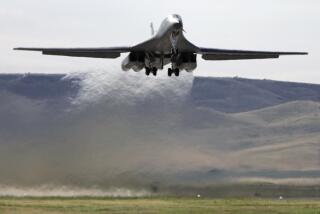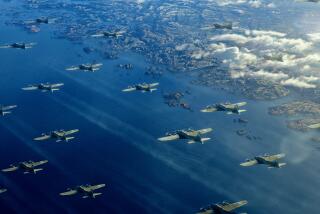31 Missions in 18 Months : B-17 Pilot Recalls the Drama of WWII
- Share via
Gerald (Mac) McClelland--a bomber pilot from Iowa who took his first plane ride as a kid in the back of a Piper Cub over a summer cornfield--remembers the mission like it was yesterday.
It was April 25, 1945, and a long way from Des Moines. The target was the Skoda Armament plant deep inside Nazi-controlled Czechoslovakia. McClelland was at the controls of “Blinken Betsy,” one of nearly 300 B-17 bombers in formation thousands of feet over war-torn Europe.
“The crew didn’t talk much,” McClelland remembered recently on the 40th anniversary of the mission, the final European bombing run by U.S. planes in World War II. “We never did going out.”
Music from the British Broadcasting Co. filled the headsets of the 10 crew members.
Orders were to bomb the factory and a nearby airfield visually, without radar, passing lower than normal over the targets.
‘Solid Black Wall’ of Smoke
Once there, smoke from anti-aircraft fire and the burning plant below obscured the ground with a “solid black wall,” recalled McClelland, now 61. “We had to make three runs over the target before we dropped our load and turned for home.”
Damage to bomber Betsy was heavy. The No. 4 engine was knocked out by ground fire, and the plane’s underbelly was peppered with bullet holes. McClelland and Co. limped back to base at Grafton Underwood in southern England on three engines.
“I flew 31 missions in 18 months and returned from every one of them,” said McClelland, who in recent years has battled a different enemy, a series of illnesses that forced him to retire early from a Downey aerospace plant and now keeps him close to his Whittier home.
“But that last mission was one of the toughest,” he said. “You just never knew when your luck was going to run out. Thank God, I made it.”
Twelve days after that mission, the war ended--and McClelland’s stint as a combat pilot was over.
Celebrants Set Haystack Ablaze
The lanky second lieutenant, all of 20 at the time, was on base when news of the German surrender was broadcast. He and several others hiked to a nearby farm, set a huge haystack on fire and celebrated with a drink or two.
“It was over,” said McClelland, now 61, “and I figured that was that.”
Four decades later, however, the images of war again occupy McClelland’s thoughts as the world continues to pause and honor the 40th anniversaries of World War II’s holiest--and hellish--days. He remembers the camaraderie among a class of gung-ho, greenhorn pilots. He can’t forget the destruction wreaked by the B-17’s massive payloads.
And death--the ever-present thought of friends and foes lost in the struggle--still leaves him cold and quiet.
“For a teen-ager from Iowa, who enlisted because he wanted to fly, it was some experience,” said McClelland, who left the Air Force in October, 1945. In 1956 he moved with his wife and four daughters to Southern California to work at the Rockwell International Corp. as a quality control supervisor.
“I wouldn’t take a million dollars for the experiences I had,” he said. “But at the same time, I wouldn’t take all the money in the world to do it all over again.”
More to Read
Sign up for Essential California
The most important California stories and recommendations in your inbox every morning.
You may occasionally receive promotional content from the Los Angeles Times.












